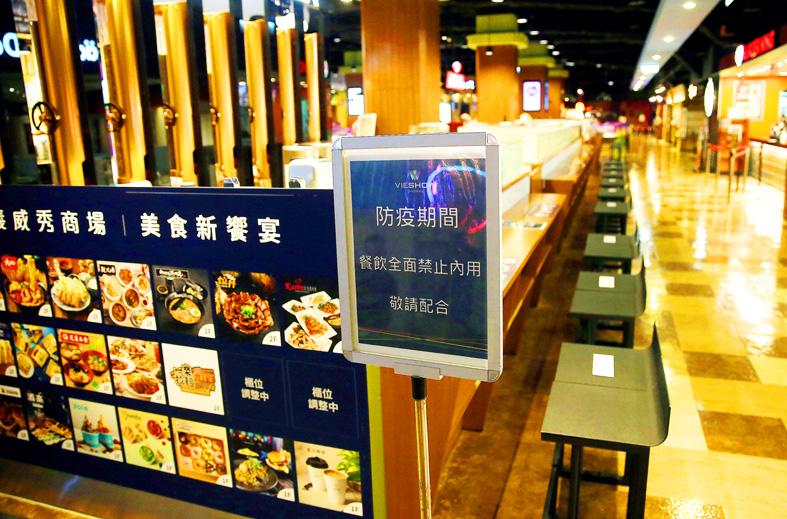Nearly all local governments are to continue barring restaurants from offering dine-in services until at least July 26, despite the Central Epidemic Command Center (CECC) allowing dining in at restaurants that take anti-COVID-19 measures.
The CECC on Thursday last week extended a nationwide level 3 COVID-19 alert to July 26, but said that, starting tomorrow, some measures would be eased, including the conditional lifting of a nationwide dine-in ban.
However, Penghu County is the only county that would lift the ban, after the Hualien and Kinmen county governments over the weekend announced that the restrictions would stay in place under their jurisdictions.

Photo: CNA
The decision to maintain the ban by almost all local governments was apparently prompted by reactions from the public, who remained unsure over the CECC success in controlling the local COVID-19 outbreak.
Kinmen County Commissioner Yang Cheng-wu (楊鎮浯) said the county previously decided to ease the dine-in ban in accordance with CECC guidelines, as Kinmen has remained COVID-19 free.
A rapid-testing station at Kinmen Airport has effectively blocked infected travelers from entering the island, he said.
However, the situation changed in the past two days, after the Executive Yuan’s vaccine registration system allowed people aged 50 or older to get vaccinated in other counties, Yang said.
As the Kinmen County Government yesterday began administering the AstraZeneca COVID-19 vaccine to people aged 40 or older, many Taiwanese from other parts of the nation have arrived on Kinmen to get vaccinated, he said.
“To prevent loopholes in our disease prevention system, people will not be allowed to dine in restaurants until after July 26,” Yang said.
The Hualien County Government originally decided to ease dine-in restrictions tomorrow, but reversed course late on Saturday night following a backlash from restaurants and people criticizing the move on social media.
“Many restaurateurs told us that they were concerned about health risks if they start serving dine-in customers. After careful consideration, we have decided to continue banning dine-in services as long as the nation is under the level 3 alert,” the county government said in a statement, adding that curbing the spread of the virus is its main priority.
New Taipei City Mayor Hou You-yi (侯友宜) was also critical of the CECC’s new policies.
“We still have not effectively blocked many hidden transmission chains in the community. Given that the nation has such a low vaccination coverage rate, now is not the time to ease the restrictions,” he said yesterday.
“The CECC guidelines are filled with conflicting rules, making it impossible for local government officials to enforce them,” he said, adding that giving guidelines that are near impossible to enforce would hurt the CECC’s credibility.
“The CECC should be responsible and give consistent rules nationwide,” as this would help the central and local governments synchronize their disease prevention efforts, Hou said.
Premier Su Tseng-chang (蘇貞昌) yesterday said that the CECC relaxed restrictions in certain areas after considering all factors.
Local governments can make adjustments depending on the local situation, Su said.
The arrangement is similar to giving local governments “the authority to declare a typhoon day depending on the local wind and rain situation,” Su said. “The CECC gives health guidelines, and local governments and companies can decide if they go beyond them when setting the rules.”

Eight restaurants in Taiwan yesterday secured a one-star rating from the Michelin Guide Taiwan for the first time, while three one-star restaurants from last year’s edition were promoted to two stars. Forty-three restaurants were awarded one star this year, including 34 in Taipei, five in Taichung and four in Kaohsiung. Hosu (好嶼), Chuan Ya (川雅), Sushi Kajin (鮨嘉仁), aMaze (心宴), La Vie by Thomas Buhner, Yuan Yi (元一) and Frassi in Taipei and Front House (方蒔) in Kaohsiung received a one-star rating for the first time. Hosu is known for innovative Taiwanese dishes, while Chuan Ya serves Sichuan cuisine and aMaze specializes

STATS: Taiwan’s average life expectancy of 80.77 years was lower than that of Japan, Singapore and South Korea, but higher than in China, Malaysia and Indonesia Taiwan’s average life expectancy last year increased to 80.77 years, but was still not back to its pre-COVID-19 pandemic peak of 81.32 years in 2020, the Ministry of the Interior said yesterday. The average life expectancy last year increased the 0.54 years from 2023, the ministry said in a statement. For men and women, the average life expectancy last year was 77.42 years and 84.30 years respectively, up 0.48 years and 0.56 years from the previous year. Taiwan’s average life expectancy peaked at 81.32 years in 2020, as the nation was relatively unaffected by the pandemic that year. The metric

Taiwan High Speed Rail Corp. (THSRC) plans to ease strained capacity during peak hours by introducing new fare rules restricting passengers traveling without reserved seats in 2026, company Chairman Shih Che (史哲) said Wednesday. THSRC needs to tackle its capacity issue because there have been several occasions where passengers holding tickets with reserved seats did not make it onto their train in stations packed with individuals traveling without a reserved seat, Shih told reporters in a joint interview in Taipei. Non-reserved seats allow travelers maximum flexibility, but it has led to issues relating to quality of service and safety concerns, especially during

A magnitude 5.1 earthquake struck Chiayi County at 4:37pm today, the Central Weather Administration (CWA) said. The hypocenter was 36.3km southeast of Chiayi County Hall at a depth of 10.4km, CWA data showed. There were no immediate reports of damage resulting from the quake. The intensity of the quake, which gauges the actual effect of a seismic event, measured 4 in Chiayi County, Tainan and Kaohsiung on Taiwan's seven-tier intensity scale, the data showed. The quake had an intensity of 3 in Chiayi City and Yunlin County, while it was measured as 2 in Pingtung, Taitung, Hualien, Changhua, Nantou and Penghu counties, the data